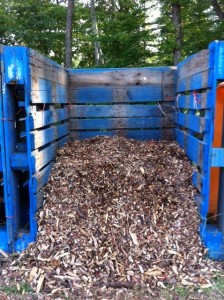A pilot composting program, among the first Green Fund projects implemented at Ole Miss, promotes a new and relatively easy avenue for sustainability. Launched at the beginning of the fall 2013 semester, the program routes food waste from the Residential College South and the Luckyday Residential College cafeterias to the Maynard P. Quimby Medicinal Plant Garden on campus, where it is composted.
During our first semester, we collected 146 5-gallon buckets of food waste – 65 percent of which was compostable. The waste is now becoming nutrient-rich, usable soil amendments (material added to soil to improve its properties) in our compost bins. Once the compost has turned to soil, it will be used by the Medicinal Plant Garden staff and the Residential College Garden Club. We have started again this spring and are excited to be in operation again.
So what is composting, and why is it important? Composting is the decomposition of organic materials to produce usable soil. The materials produced through composting act as excellent fertilizers by encouraging the colonization of beneficial bacteria and fungi that return rich nutrients back into the soil.
Using compost in gardens reduces the need for chemical alternatives. According to the U.S. Environmental Protection Agency, food and lawn waste composes roughly 20 to 30 percent of all waste. What a shame it is to send this type of waste to a landfill when it can easily and cheaply be turned into a valuable product for gardens. Because food waste requires light and air to compost — which it does not have in a landfill — composting also helps to reduce the emission of harmful greenhouse gases including methane and carbon dioxide.
The idea for the composting program originated during a Students for a Green Campus meeting in August 2012. A waste reduction action team was assembled, primarily led by Caroline Williams, who graduated in 2012, and me. We worked diligently to develop a proposal for the project. In spring 2013, I presented the proposal to the Green Fund Committee and was awarded $3,000 to bring this idea to fruition.
This project is primarily run by a team of three students, supervised by the Office of Sustainability, who take food waste from the Residential College’s cafeteria and compost it at the medicinal plant garden.
Our long-term goal is to expand the composting program to other dining facilities on campus, decreasing the amount of food waste sent to the landfill from the university and decreasing the university’s carbon footprint.
The Green Fund is a great opportunity to start your own sustainability project at Ole Miss. If you have an idea for a Green Fund project, visit http://www.olemiss.edu/greenfund. For more information, e-mail green@olemiss.edu.
